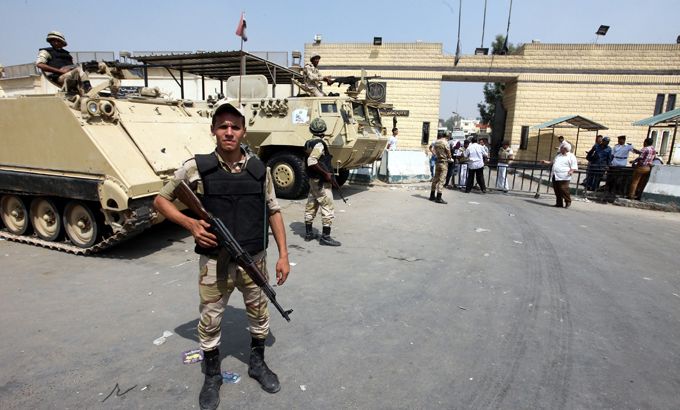Egypt’s anti-coup alliance plans protests
Muslim Brotherhood and other groups call for protests dubbed “Friday of martyrs”, as ex-leader Mubarak freed from jail.

Demonstrations against Egypt’s military-backed interim government have begun in Cairo after a call from the Muslim Brotherhood and other anti-coup groups, as a crackdown against Brotherhoood leaders continues.
Hundreds of protesters have gathered at several locations around Cairo to begin marches that followed Friday prayers.
Supporters of the anti-coup alliance have dubbed the latest protest a “Friday of martyrs”, with 28 mosques in the Cairo area named as points of departure for the demonstrations.
Police and the military have beefed up security at key locations throughout the city, with a number of armoured personnel carriers deployed at the presidential palace and the defence ministry, state news agency MENA reported.
Earlier, authorities detained Ahmed Aref, a spokesman for the group, and Hassan al-Brins, a member of parliament representing the Freedom and Justice Party (FJP), the political wing of the Muslim Brotherhood on Thursday, reported Al Jazeera’s Bernard Smith in Cairo.
In recent days, Brotherhood protests that once attracted tens of thousands of people at locations across the country have ebbed, suggesting the group’s famed organisational strength may have been damaged by the arrest of its leaders.
They have also been subject to a violent crackdown on the part of authorities, with at least 900 people reported killed in the last eight days, as security forces have moved to end anti-coup demonstration.
“We will remain steadfast on the road to defeating the military coup,” a pro-Morsi alliance called the National
Coalition to Support Legitimacy and Reject the Coup said in a statement.
Mubarak under house arrest
Protests were also called against the release of Hosni Mubarak, the former Egyptian president, from prison on Thursday and his transfer to house arrest at a military hospital. Those protests were later cancelled.
Mubarak was moved from Tora prison to a military hospital in the Maadi suburb of Cairo by military helicopter on Thursday, after a court ruled that he had served the maximum amount of pre-trial detention in the cases remaining against him.
The longtime autocrat, forced to quit by a popular uprising in 2011, will remain under house arrest as he stands trial on corruption and murder charges.
Mubarak spent several weeks in the same hospital during his two-year detention, after lawyers cited poor conditions in prison. Authorities renovated a ward in Tora where Mubarak was later held.
A small crowd of supporters gathered outside the prison and cheered as the helicopter took off.
His release has been met with indifference from many Egyptians, who are more focused on the country’s recent political crisis and last week’s massacre of supporters of deposed President Mohamed Morsi.
“His release was widely covered, but after two years, at this time, many Egyptians see Hosni Mubarak as an irrelevance,” Al Jazeera’s Smith reported.
Ongoing trials
Mubarak’s next court hearing is scheduled for Sunday. He still faces a retrial on charges of killing protesters during the 2011 revolution, and three corruption cases as well.
But he has already spent more than two years in pre-trial detention, the maximum allowed under Egyptian law, and so the courts ruled him eligible for release pending trial.
Hazem el-Beblawi, the prime minister, said on Wednesday night that Mubarak would be placed under house arrest following his release.
Mubarak chose to be held at the military hospital, the official MENA news agency reported.
At least one of the corruption cases against Mubarak could be close to a settlement.
Wednesday’s ruling ordering his release concerns the so-called “Ahram gifts” case, in which Mubarak allegedly accepted $11m worth of gifts, including jewelry and watches, from the state-run newspaper Al-Ahram.
He has allegedly already repaid the amount of the gifts, and the other defendants in the case have been released, suggesting that the charges against Mubarak could eventually be dropped.
Mubarak was convicted last year of involvement in the murder of protesters during the 2011 uprising, and sentenced to life in prison, but was granted a retrial in January.